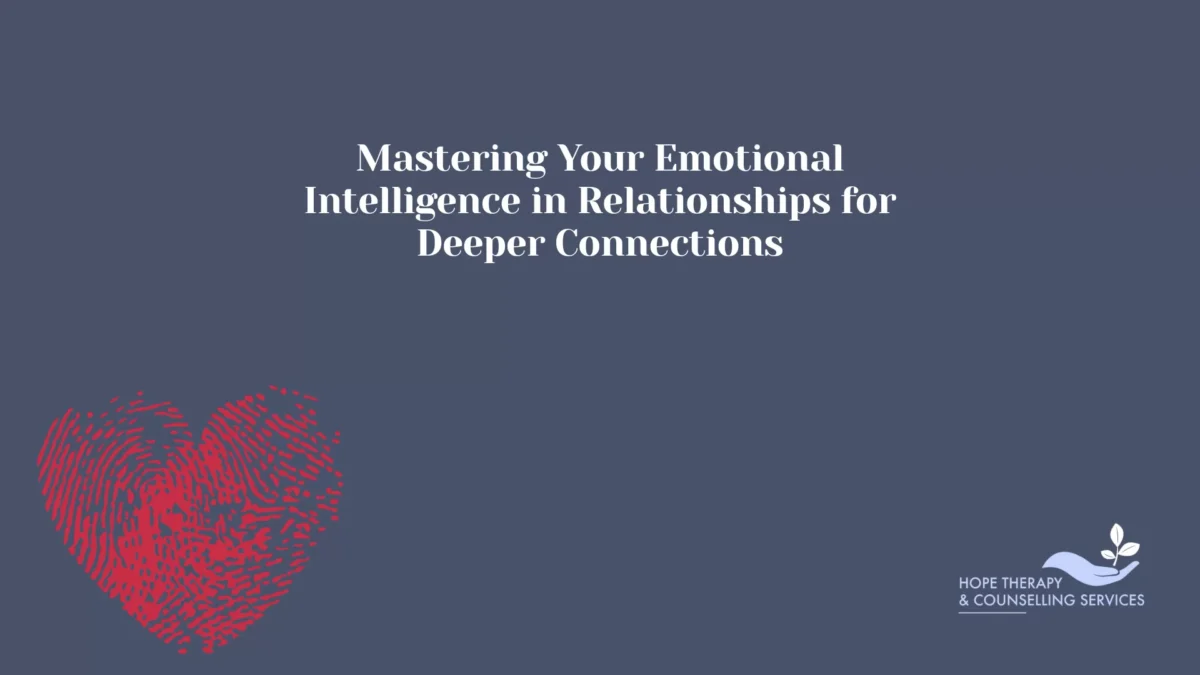Emotional intelligence (EQ) isn’t just a workplace buzzword. It’s the quiet superpower that shapes how we connect, resolve conflict, and feel truly seen in our relationships.
If you’ve ever walked away from an argument thinking, “That didn’t need to go that way,” or found yourself shutting down when conversations get too intense — you’re not alone. Many of us were never taught how to work with emotions, let alone someone else’s. But EQ isn’t something you’re born with or without. It’s something you can grow.
And when you do, your relationships change. They deepen. They become safer, more honest, and more connected.
What is Emotional Intelligence, Really?
Emotional intelligence is your ability to:
- Understand your own emotions
- Manage those emotions effectively
- Recognise emotions in others
- Respond to others with empathy
It sounds simple. But in real life, it looks like catching yourself before snapping. Or sitting with discomfort instead of storming off. Or realising your partner’s bad mood might not be about you.
EQ isn’t about being emotionally perfect — it’s about being emotionally aware.
Why Emotional Intelligence Matters in Relationships
You can have chemistry, shared goals, even love — but without emotional intelligence, relationships can still feel exhausting.
1. Better Communication
EQ helps you express feelings clearly and hear others without defensiveness. That means fewer misunderstandings and more “I get it now” moments.
2. Stronger Conflict Resolution
When you’re emotionally attuned, you can stay grounded in conflict instead of going straight to fight, flight, or freeze. That means issues get resolved — not recycled.
3. Deeper Empathy and Intimacy
Being emotionally intelligent means you’re better able to hold space for someone else’s experience. This builds emotional intimacy — the sense of being fully known and accepted.
4. Healthier Boundaries
EQ helps you recognise your own limits and communicate them respectfully, creating safety on both sides.
5. Reduced Reactivity
You stop running on emotional autopilot. You notice patterns. You respond instead of react.
Growing Your Emotional Intelligence: A Practical Guide
You don’t need to be a counsellor to improve your EQ. Here’s where to start:
1. Name Your Emotions in Real Time
Instead of saying “I’m fine” when you’re not, try to pinpoint the real feeling. Is it frustration? Disappointment? Embarrassment? Language helps us regulate and communicate better.
2. Get Curious, Not Critical
When you’re triggered, ask yourself: “What’s really going on here?” Are old wounds surfacing? Is this about now, or something deeper?
3. Pause Before You React
Create a small gap between feeling and doing. Take a breath. Go for a walk. This gives your thinking brain time to catch up with your emotional brain.
4. Listen with Empathy, Not a Fix-It Mentality
Sometimes the most emotionally intelligent thing you can do is just listen — no advice, no correction, just presence.
5. Reflect on Patterns
Notice recurring issues in your relationships. Are there themes? Do you tend to withdraw, lash out, or people-please? Awareness is the first step to change.
6. Get Support if You’re Stuck
Some emotional wounds run deep. If you struggle with trust, abandonment, or constant conflict, counselling can offer a safe place to unpack what’s underneath.
Emotional Intelligence in Action: A Relationship Example
Let’s say your partner forgets an important date. Your instinct might be to withdraw or lash out. But with EQ, you:
- Pause to recognise you’re feeling hurt and disappointed
- Communicate that without blaming: “I felt unimportant when you forgot”
- Stay open to their perspective: “I know you’ve had a lot on your plate”
- Work together on a solution: “Next time, a reminder would help”
This is how EQ turns disconnection into reconnection.
Can Emotional Intelligence Be Learned Later in Life?
Absolutely. Many of us grew up in homes where emotions weren’t talked about — or were punished. But brains are changeable. EQ is like a muscle. The more you practice, the stronger it gets.
Whether you’re navigating romantic relationships, family dynamics, or friendships, developing emotional intelligence will transform how you relate — not just to others, but to yourself.
Counselling Can Help You Strengthen Your EQ
If you’re tired of feeling misunderstood, reactive, or emotionally stuck, counselling can help you understand the “why” beneath the pattern. And more importantly — how to shift it.
At Hope Therapy & Counselling Services, we support individuals and couples in building self-awareness, emotional regulation, and deeper connection.
Book your free consultation here and start creating the emotionally intelligent relationships you deserve.
Frequently Asked Questions
Is emotional intelligence the same as being sensitive?
Not quite. EQ is about being aware of emotions — not necessarily feeling them more intensely. It includes regulation, not just sensitivity.
Can emotional intelligence help with anxiety in relationships?
Yes. EQ helps you pause, reflect, and communicate more clearly — which reduces the uncertainty and overthinking that often drives anxiety.
Can couples counselling improve emotional intelligence?
Definitely. In fact, it’s one of the main goals. Counselling helps both partners become more self-aware, less reactive, and more understanding of each other.
You Can Learn to Relate Differently
EQ isn’t about being perfect — it’s about being present. You don’t have to keep repeating the same emotional patterns.
Book a free consultation today and learn how to connect with more empathy, confidence, and calm.
Hope Therapy & Counselling Services offers compassionate support online or face-to-face. Whether you want to work on personal growth or relationship dynamics, we’re here to help you connect more deeply — with yourself and others.

